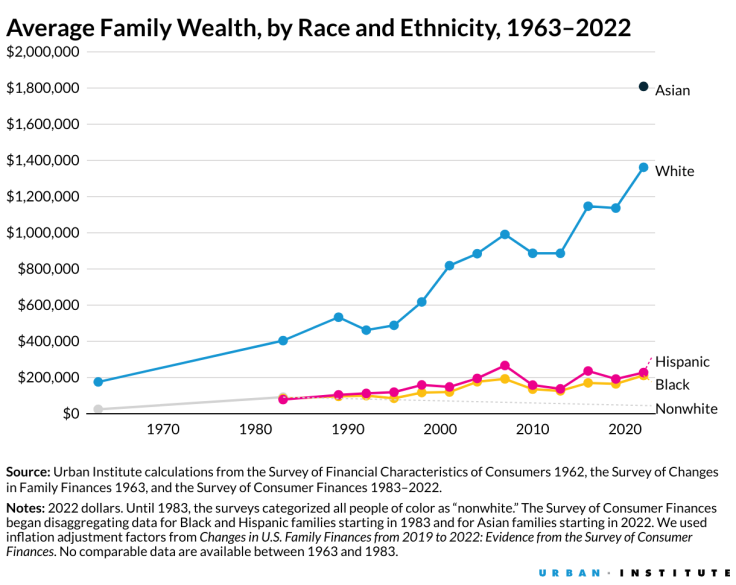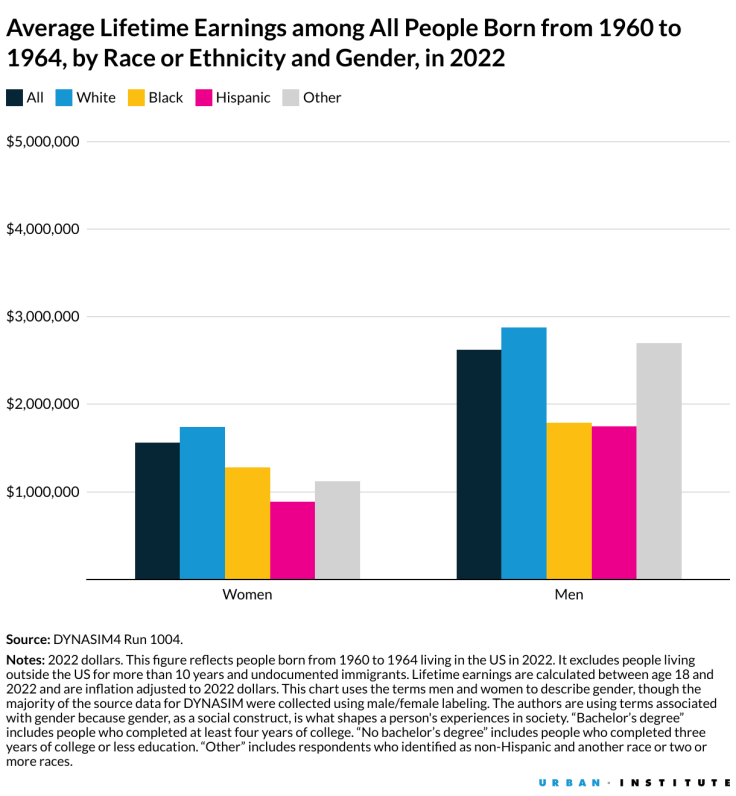
The average wealth gap between White families and Black and Latino ones reached a new high in 2022, exceeding $1 million in household wealth for the first time, a new study showed.
The report by the Urban Institute, a research institution specializing in economic and social policy analysis, highlighted the scale of this data: in average, White families had in 2022 over six times the wealth of Black and Hispanic families.
"Racial wealth inequities have persisted for generations, reflecting the long-standing effects of racist policies, not individual intentions or deficits," reads a passage of the document.
"In a nation that professes that those who work hard and play by the rules should be rewarded with social and economic upward mobility, these persistent disparities are a stark reminder that, as a society, we have not achieved this goal," the think tank adds.
The Urban Institute's data, which comes largely from the Survey of Consumer Finances conducted every three years by the Federal Reserve, shows that, over the past decades, the difference in wealth held by White, Black, and Latino families has continuously grown.

In 1992, the average wealth of Hispanic families was $112,121, while that of Black families was $99,801. In contrast, White households had an average of $462,708, four times the wealth of Latino families and Black families. The nominal difference was approximately $356,747.
By 2022, the average wealth of Latino families had increased to $227,544, and that of Black families to $211,596. In comparison, White households possessed $1,361,806, surpassing the combined wealth of Hispanic and Black families by over six times. The nominal difference was about $1,142,236.
According to researchers, this phenomenon is unique to the United States and is not observed in most other developed countries. "Wealth inequality is higher in the United States than in almost any other developed country and has been increasing for much of the past 60 years," they state in the document.
The report shows gaps in earnings, homeownership rates, retirement savings, emergency savings, benefits from tax subsidies, and intergenerational transfers contribute to wealth inequities.
One key finding that illustrates the overall wealth gap is the amount saved from earnings, a factor where the study showed consistent disparities by race, as well as by gender regardless of race or ethnicity.
The average White man between ages 58 and 62 in 2022 earned $2.9 million over his career, while the average Black man earned $1.8 million and the average Latino man earned $1.7 million, according to the Urban Institute's research.

In comparison, the document says that, "Women earn less overall but (ethnic) gaps remain". The average white woman earned $1.7 million over her career, while the average Black woman earned $1.3 million and the average Latinas earned $883,000.
"Educational attainment is not enough to overcome these differences: even among people who have a bachelor's degree, all women of color earn less on average than White women, and all men of color earn less on average than White men," Urban Institute says in the document.
The key factors responsible for contributing to earning disparities are labor market inequities, the study said. This includes "employment discrimination that leads to occupational crowding in lower-paying roles—and uneven pay across identical roles."
"Discriminatory housing policies"

According to the report, homeownership remains the main catalyst for wealth accumulation in the U.S., with Black families experiencing a persistent lag due to the enduring impact of "discriminatory housing policies."
The average homeownership rate among White households has risen from approximately 64.9% in 1960 to 73.1% in 2022, as per the report.
In contrast, Black homeownership has only increased from 38.2% to 44.3% during the same period. While Latino and Asian families reached their highest recorded average homeownership rates in 2022, at 51.1% and 63.2%, respectively, they still fall behind the rates of White households.
© 2024 Latin Times. All rights reserved. Do not reproduce without permission.







